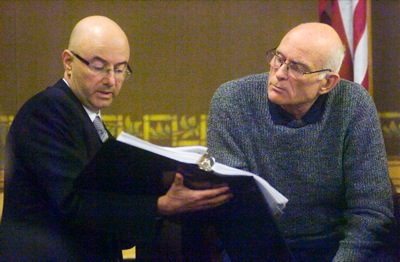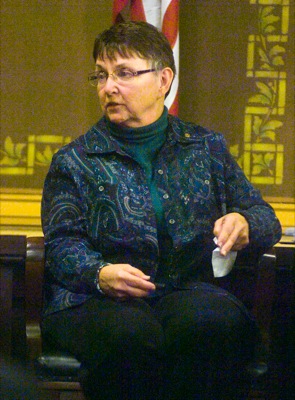Thursday, January 10th, 2013
Farmers: Land worth $2.4M
Trial over reinbursement for flood damage from spillway begins
By Nancy Allen

Photo by Mark Pummell/The Daily Standard
Pete DeMarco, attorney for the state of Ohio, shows Wayne Doner information during a jury trial Wednesday in Mercer County Common Pleas Court. The trial is being held to determine how much money the state must compensate Wayne and wife Janet Doner for their flooded farmland. The trial is expected to wrap up Friday.
CELINA - Eight jurors on Wednesday heard testimony in Mercer County Common Pleas Court from a rural Celina couple who believes the state owes them $2.4 million for their flood-damaged farmland.
The state says $1.6 million is sufficient.
Wayne and Janet Doner are among 86 landowners who won a case in the Ohio Supreme Court in 2011 that blamed Grand Lake's West Bank spillway, opened in 1997, for causing increased flooding to their land. The High Court ruling cleared the way for local jury trials to determine compensation.
The Doners' trial is the first to be held.
The Doners, who have 222 acres near the Wabash River off the north side of Doner Road at Linn Road in Indiana, told the jury they had light flooding on small areas of their farmland before the new spillway opened. Their land now floods almost every year, and the flooding is more severe, they said. In 2011, their farmland flooded five times.
Water from Grand Lake is released through the West Bank spillway into Beaver Creek, which flows into the Wabash River.
The Doners say there are numerous places along the bank of the Wabash River that have blown out, washing sand, rocks, coolers, traffic signs and other debris onto their farmland. Some of the areas were reinforced with cement only to be washed away again by floodwaters that tossed chunks of cement onto their land.
Numerous farm drainage tiles also have broken due to increased water pressure and being clogged with debris since the new spillway opened, they said. Janet Doner testified that backed-up tiles have blown out and sent geysers shooting three feet in the air.
There are about 13 acres they can no longer farm because of the flood damage and blown out areas, the Doners said. The areas upon which they can plant wheat have shrunk because water stands too long. Repeated flooding compacts the soil, making it less productive and they have broken farm machinery from hitting debris washed into fields, they testified.
Tom Fusonie, one of three Columbus attorneys representing the Doners, showed slides of piles of sand, corn stalks and other debris on the farmland. Some photos showed most of the land completely submerged.
During cross examination of Wayne Doner, the state's attorney, Pete DeMarco, charged that the couple can still farm the land and has gotten crops off the land every year since the new spillway opened. They just have to wait until the ground dries out, he said.
"The property is not flooded 24 hours a day, seven days a week, 365 days a year," DeMarco said.
The Doners said even though they were able to plant, yields were reduced because floodwater harmed the crops and soil. Later planted crops also produce lower yields, they said.
Wayne Doner said he did not have any documentation of his yields prior to 1997, but he remembers they were better, he told DeMarco. This past year produced his best yields in a while, Doner said, but only because of the drought.
Janet Doner became emotional when asked by Fusonie why the family still wants to farm the land despite the increased flooding.
"It's in my blood since we were married," Janet Doner said, her voice cracking. "I'd like to pass it down to my children and grandchildren."
The Ohio Department of Natural Resources replaced the former 39-foot spillway with a 500-foot spillway because a dam study showed the old structure was in danger of overtopping.
After the trial, the Doners' 222 acres will be recorded on maps as a perpetual flowage easement area of the state, Fusonie said. They will still own the land, be able to farm it and pay property taxes on it, he said.
Appraisers representing both sides were scheduled to testify today. The proceeding is expected to conclude Friday with closing arguments and jury deliberation.
Ohio Department of Natural Resources Director Jim Zehringer of Fort Recovery is attending the trial.
The state in December was found in contempt for moving too slowly to compensate the 80-plus landowners who won the lawsuit. The state was ordered to complete land appraisals and file motions for compensation hearings. Prior to December, only eight motions had been filed for compensation hearings.
Correction:
The story incorrectly said Wayne and Janet Doner's land is in Indiana; it's in Ohio. The error was made in editing. The story incorrectly said the amount the state believes it should compensate the Doners is $1.6 million; it's $1.36 million. The error was made in reporting.

Photo by Mark Pummell/The Daily Standard
Janet Doner testifies during a jury trial Wednesday in Mercer County Common Pleas Court. The trial is being held to determine how much money the state must compensate Janet and husband Wayne Doner for their flooded farmland. The trial is expected to wrap up Friday.



